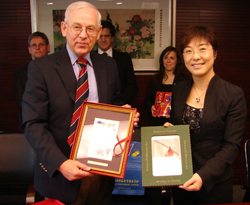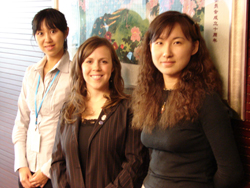 |
Don Leuenberger, UNMC vice chancellor for business and finance, and Yang Xinyu, deputy secretary general for the China Scholarship Council, exchanged gifts after they signed a multi-year agreement that makes UNMC one of the elite U.S. universities to partner with the CSC. In the background from left are three UNMC attendees at the ceremony: Dan Monaghan, Ph.D., Keith Mueller, Ph.D., and Mary Cavell. |
 |
Mary Cavell, center, coordinator of the Asia Pacific Rim Development Program for UNMC, poses with the two project officers from the China Scholarship Council who she will work with in the future — Chen Chen, left, and Wu Nan. |
After three days in China, I’ve seen first-hand the importance of building relationships and how UNMC is working hard to strengthen its Chinese ties.
I spent most of Thursday with Don Leuenberger, vice chancellor for business and finance, and Kai Fu, M.D., Ph.D., assistant professor, pathology and microbiology, and associate director of UNMC’s Asia Pacific Rim Development Program (APRDP). It was truly an educational experience.
The day started at the China Scholarship Council (CSC) in Beijing with Leuenberger signing a multi-year agreement along with Yang Xinyu, deputy secretary general for the CSC.
“This was a momentous day for UNMC,” Leuenberger said. “This shows that our international reputation is on the rise. We are a preferred site for top Chinese students. It shows that our APRDP program is making great progress.”
Under the agreement, the CSC will subsidize a large portion of the travel, salary and tuition costs for Chinese students to come to UNMC to study or do research as post docs. Already, 10 Chinese students are at UNMC — six Ph.D. students, one M.D./Ph.D. student and three post docs.
“This agreement will provide opportunities for our own students to study in China,” Leuenberger said.
He cited the work of Dr. Fu and Jialin Zheng, M.D., professor, pharmacology and experimental neuroscience and director of APRDP, for establishing the relationship with the CSC.
Dr. Zheng, who is a graduate of the Shanghai Jiao Tong University School of Medicine, has used his connections in Shanghai to make tremendous inroads, Leuenberger said.
“We have built a reputation in China — and especially in Shanghai — as the preferred site for the rotation of Chinese medical students in the United States,” he said.
UNMC will be one of just 14 U.S. institutions who have been invited by the CSC to present at the International Graduate Scholarship Conference today in Beijing. The list of 14 universities includes some of the most outstanding schools in the country including Harvard University, Yale University, the University of Michigan, and Washington University in St. Louis.
Leuenberger said the CSC agreement will provide UNMC with access to some of the top universities in China.
Following the CSC signing ceremony, Leuenberger, Dr. Fu and I hopped on board a bullet train and headed to Tianjin, China — the third largest city in China behind Shanghai and Beijing.
We met with several leading officials at Tianjin Medical University Cancer Institute and Hospital to hold preliminary discussions on the possibility of establishing a partnership with the hospital in conjunction with our expertise in lymphoma and other cancers.
Dr. Fu grew up in Tianjin and is a graduate of medical school there. As we met over lunch in a Tianjin restaurant, Li-Jun Zhang, vice chief of the hospital’s Office of International Exchange and Cooperation, mentioned that she had been to Omaha several years ago and toured UNMC’s Lied Transplant Center. She remembered meeting with David Crouse, Ph.D., associate vice chancellor for academic affairs.
|
|
The hospital has partnerships with three other institutions, including M. D. Anderson Cancer Center in Houston. It was very obvious from the discussion that they would like to make UNMC its fourth partner.
We boarded the bullet train and headed back to Beijing for a dinner with three leading international officials of the Graduate University of the Chinese Academy of Sciences: Shizhuang Ma, Ph.D., vice president; Xiangbin Zhu, Ph.D., assistant president; and Yong Xie, staff member.
After just four hours of sleep the previous night, I was dragging by the time we reached the Mongolian restaurant for dinner.
It turned out to be a night that I’ll never forget. Ma and Zhu were longtime friends of Leuenberger, and it was obvious they had a special relationship.
After dinner, we watched a stunning hour-long presentation by a Mongolian dance troupe. Multiple toasts were made and gifts were exchanged.
By the time the evening concluded, I knew I had been part of something special. I recognized that even though Beijing and Omaha are worlds apart, it really makes no difference.
In the end, it’s all about relationships.